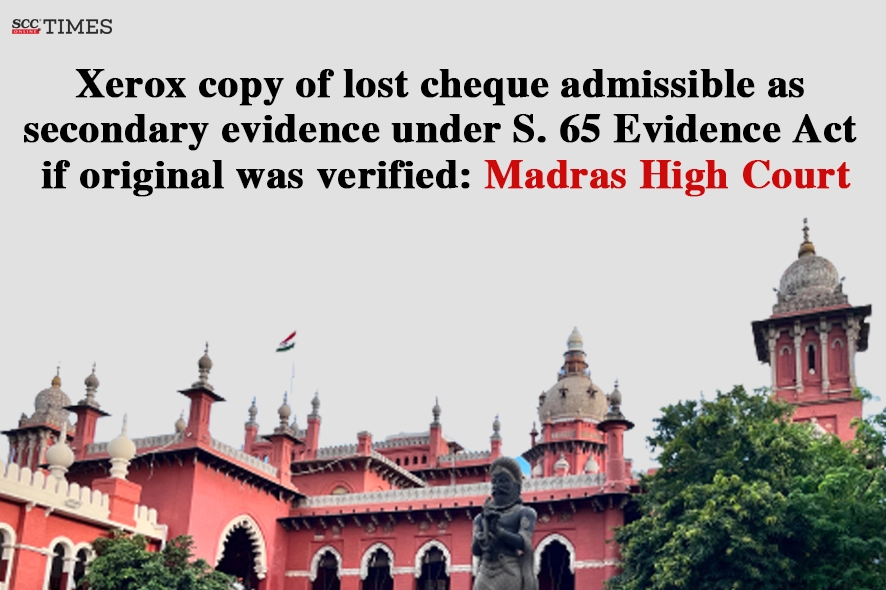Madras High Court: In the present case, the petitioner had filed a Criminal Revision Case under Sections 438 and 442 of the Bharatiya Nagarik Suraksha Sanhita, 2023 (‘BNSS’), challenging the order of the Judicial Magistrate I, Pudukottai contending that the Trial Court ought to have accepted the xerox copy of the original cheque as secondary evidence. A Single Judge Bench of Shamim Ahmed, J., while allowing the Criminal Revision Case, set aside the order and held that rejection of the xerox copy solely for lack of proof of loss, without adhering to Sections 63(2), 63(3), and 65 of the Evidence Act, 1872 (‘Evidence Act’), was unsustainable. The Court emphasised that the Trial Court, having accepted the original cheque and made an endorsement, ought to have admitted the xerox copy, but its failure to do so, resulted in a miscarriage of justice.
Background:
The respondent had borrowed a sum of Rs 5,50,000 from the petitioner on 01-02-2014 and issued a cheque drawn on ICICI Bank, Virachilai Branch, Pudukottai, as security for the loan. When the cheque was presented for encashment, it was returned with the endorsement “Funds Insufficient.” The petitioner then issued a legal notice on 14-06-2014 demanding repayment, but the notice was returned as refused. Consequently, the petitioner initiated proceedings under Sections 138 and 147 of the Negotiable Instruments Act, 1881 before the Judicial Magistrate I, Pudukottai, seeking repayment and penal action.
During trial, the petitioner filed a petition under Section 63(a) of the Evidence Act to admit a xerox copy of the cheque as secondary evidence, stating that the original had been misplaced by his erstwhile Advocate. The Trial Court dismissed the petition, holding that there was no evidence to support the claim that the original cheque was lost by the Advocate. The petitioner then filed a Criminal Revision Case challenging this order.
In response, the respondent submitted that the petitioner’s sworn statement had been recorded back in 2014, and the petition to admit secondary evidence was filed only after a lapse of 10 years. The respondent argued that the petitioner failed to examine the previous counsel or produce any supporting documents to substantiate the claim of loss. Therefore, the Trial Court rightly rejected the petition.
The petitioner contended that the original cheque had been produced at the time of filing the complaint and was returned by the Trial Court after recording the sworn statement, with an endorsement to that effect. He argued that since the Trial Court had verified the original cheque and retained xerox copies, the xerox copy should be accepted as secondary evidence under Sections 63(2) and 65 of the Evidence Act. He further claimed that refusal to admit the xerox copy would result in significant monetary loss.
Analysis and Decision:
The Court observed that the general principle was that if the original document existed and was available, it had to be produced because it was the best evidence. However, if the original was lost, destroyed, detained by the opponent or a third person, or physically irrecoverable, secondary evidence was admissible. The Court noted that the reading of the proviso to Section 65 of the Evidence Act made it clear that the provision had been enacted to safeguard the interest of a person unable to produce the original. Thus, secondary evidence relating to a document could be given.
The Court reiterated that, as per Sections 63(2) and 63(3) of the Evidence Act, secondary evidence included copies made from the original by mechanical process ensuring accuracy, and copies made from or compared with the original. The Court examined the order and the sworn statement of the petitioner recorded on 15-07-2014 and found that the Trial Court had verified the original cheque, retained the xerox copy, and returned the original to the Petitioner with an endorsement. Thus, the provisions of Sections 63(2) and (3) of the Evidence Act had been satisfied.
The Court noted that the petitioner had produced the original cheque at the time of filing the complaint and that the Trial Court had acknowledged its verification. The xerox copy retained by the Trial Court was therefore admissible as secondary evidence. The Trial Court, having accepted the original cheque and made an endorsement, ought to have allowed the petition to admit the xerox copy, and its failure to do so resulted in a miscarriage of justice.
The Court found that the order rejecting the xerox copy solely on the ground that there was no evidence to prove the cheque was lost, without adhering to Sections 63(2), 63(3), and 65 of the Evidence Act, could not be sustained and required interference.
The Court, therefore, allowed the Criminal Revision Case and set aside the order dated 15-04-2025 passed by the Judicial Magistrate I, Pudukottai. The Court further directed the Judicial Magistrate I to receive the xerox copy of the original cheque in question as secondary evidence, expedite the trial, and conclude the same in accordance with law.
[Mohammed Iqbal v. S. Manonmanian, Crl.RC (MD) No. 662 of 2025, decided on 16-09-2025]
Advocates who appeared in this case:
For the Petitioner: A. Balaji
For the Respondent: S. Prabha, D. Ramesh Kumar







